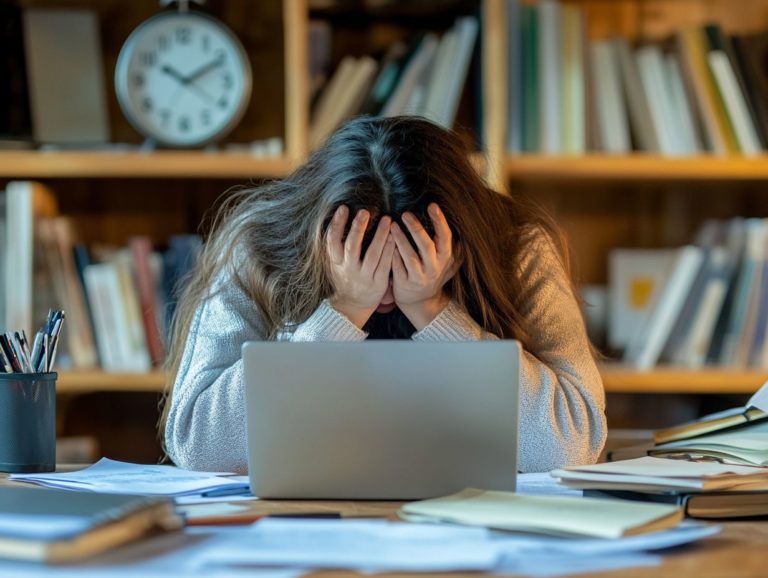5 Essential Traits of a Good Defense Lawyer
In the high-stakes realm of legal defense, the qualities you seek in a good defense lawyer can truly make all the difference.
From exceptional communication skills to a deep knowledge of the law, these traits empower lawyers to navigate complex cases while building strong relationships with their clients.
Discover five key traits that make an outstanding defense lawyer, shedding light on their responsibilities, challenges, and ethical considerations.
Embark on this exploration to uncover what it takes to excel in this demanding field.
Contents
- Key Takeaways:
- 1. Excellent Communication Skills
- 2. Strong Analytical and Critical Thinking Abilities
- 3. Knowledge of the Law and Legal Procedures
- 4. Ability to Build Strong Relationships with Clients
- 5. Confidence and Assertiveness
- What Are the Responsibilities of a Defense Lawyer?
- Frequently Asked Questions
- What are the five essential traits of a good defense lawyer?
- Why are strong communication skills important for a defense lawyer?
- How does analytical thinking help a defense lawyer?
- Can attention to detail impact the outcome of a case?
- Why is adaptability important for a defense lawyer?
- How does a strong work ethic benefit a defense lawyer?
Key Takeaways:
- Effective communication skills: Crucial for advocating for clients and building relationships.
- Strong analytical and critical thinking: Essential for assessing cases and developing strategies.
- Deep knowledge of the law: Necessary for effective representation in court.
1. Excellent Communication Skills
Excellent communication skills are essential when working with a criminal defense lawyer in San Jose, CA. These skills are critical in how your lawyer represents you in court and ensures you grasp every detail of your legal situation from the charges against you to the potential consequences.
In the legal arena, effective communication can significantly sway case outcomes and bolster your confidence. A skilled defense attorney prioritizes keeping you informed about developments, breaking down complex legal jargon, and outlining strategies for your defense.
This approach ensures you feel informed and actively engaged in your own case. The relationship you have with your attorney thrives on trust, nurtured through confidentiality and transparency.
2. Strong Analytical and Critical Thinking Abilities
A successful criminal defense lawyer must wield strong analytical and critical thinking skills to thoroughly investigate your case, review evidence, and gather information that can prove your innocence.
These skills enable them to dissect complex information and pinpoint key patterns or inconsistencies that may expose weaknesses in the prosecution’s arguments.
By meticulously scrutinizing witness statements, forensic evidence, and legal precedents, they can craft a well-rounded defense strategy tailored to your unique situation.
With effective analytical skills, these professionals can anticipate potential challenges, adapt strategies as needed, and employ creative problem-solving tactics. This thorough preparation ultimately leads to better outcomes, significantly increasing your chances of reduced charges or even a complete dismissal of your case.
3. Knowledge of the Law and Legal Procedures
A comprehensive understanding of the law and legal procedures is crucial for a criminal defense lawyer. This expertise allows them to navigate the complexities of legal troubles, ensuring they provide accurate legal advice and effectively represent clients facing serious charges.
This knowledge becomes even more vital when it includes state-specific laws and procedures, which can dramatically impact the defense strategy. Being well-versed in these regulations enables thorough trial preparation.
Passing the California State Bar Exam not only validates qualifications but also equips attorneys with essential legal frameworks needed for effective advocacy. This knowledge is crucial for achieving the best possible outcome in your trial.
As a skilled defense attorney, strategically leveraging the law is key to protecting clients’ rights and achieving favorable results.
4. Ability to Build Strong Relationships with Clients

The ability to cultivate strong relationships with clients is a cornerstone of your success as a criminal defense lawyer in San Jose, CA. This skill builds trust and understanding, which is vital when someone is seeking legal representation for serious criminal charges.
Approachability is key in this relationship; when you are warm and open, clients feel encouraged to voice their concerns and questions without hesitation. This creates a partnership built on transparency. Combined with a genuine caring nature, your approach not only alleviates client anxieties but also enhances their overall experience during a challenging time.
Your effective public speaking skills further solidify this connection. They enable you to articulate complex legal concepts in an engaging way that makes clients feel both heard and valued. By providing regular updates on case progress, you keep clients informed and engaged, reinforcing their trust in your commitment to achieving the best possible outcome.
5. Confidence and Assertiveness
Confidence and assertiveness are essential traits for a criminal defense lawyer, giving them the power to represent you effectively in court, negotiate with the prosecutor, and pursue favorable plea deals on your behalf.
When your lawyer shows confidence, it not only instills trust in you but also commands respect in the courtroom. For example, during negotiations, a lawyer who clearly articulates the strengths of your case can persuade the prosecutor to reconsider the charges or explore a more lenient plea deal.
In trial situations, assertiveness enables your lawyer to conduct sharper cross-examinations, effectively challenging the prosecution’s narrative and creating reasonable doubt. These strategies often lead to more favorable outcomes, whether that means a reduced sentence or even an acquittal for you.
What Are the Responsibilities of a Defense Lawyer?
The responsibilities of a criminal defense lawyer involve a comprehensive array of tasks aimed at protecting your rights. This includes clarifying the charges you face, meticulously investigating your case, preparing bond motions, and filing pretrial motions that could alleviate the consequences of your legal challenges.
These tasks are vital not just for crafting a solid defense strategy but also for instilling a sense of confidence in you during what can be an incredibly daunting time.
By rigorously analyzing evidence, interviewing witnesses, and conducting thorough research, the lawyer can shape the narrative in a way that significantly impacts trial preparation.
Their strong negotiation skills further enhance their role, enabling them to advocate for favorable plea deals or dismissals, which can ultimately reduce potential penalties. In essence, a lawyer’s unwavering commitment to every stage of the legal process plays a crucial role in improving your chances for a more favorable outcome, highlighting the interconnected nature of their responsibilities.
What Makes a Defense Lawyer Different from Other Lawyers?
A criminal defense lawyer stands apart from others primarily due to their specialized expertise in criminal procedure and their unwavering commitment to providing tailored legal advice for clients facing violations of the law, ensuring that your rights are defended with vigor.
This specialization is essential, as criminal law involves unique processes think arraignments, plea bargains, and jury trials that diverge significantly from the mechanisms found in civil or corporate law.
The stakes are higher than ever; potential consequences can include imprisonment or hefty fines, making the role of a criminal defense attorney absolutely crucial in navigating these complex legal landscapes.
An adept criminal defense lawyer not only helps mitigate the risks associated with charges but also understands the details of creating reasonable doubt, negotiating favorable plea deals, and advocating for your best interests throughout the judicial process.
How Can a Defense Lawyer Effectively Represent Their Client?

A defense lawyer can truly elevate their representation of you by meticulously preparing for trial, engaging in negotiations with the prosecutor for favorable terms, and maintaining transparency regarding fees and potential case outcomes.
This proactive approach lays a robust foundation for your defense, empowering the lawyer to foresee challenges and craft strategies tailored to the unique nuances of your case. Open dialogue about the legal process not only sets realistic expectations for you but also cultivates trust an essential ingredient in a collaborative attorney-client relationship.
The significance of clear communication cannot be overstated. By grasping the intricacies of fees and potential legal hurdles, you can feel genuinely supported throughout your journey. Ultimately, this level of diligence can profoundly influence the outcome of your case, equipping the defense to navigate complexities with greater efficacy.
What Are the Challenges Faced by Defense Lawyers?
Defense lawyers often confront serious challenges, such as the heavy burden of serious consequences for their clients, the intricate maze of complex legal issues, and the unwavering need to maintain integrity while relentlessly pursuing the best possible outcomes.
They must navigate the harsh realities of public perception, where the stigma surrounding their clients can invite societal judgment. This reality can create emotional strain, as defense attorneys strive to balance their commitment to legal ethics with the empathy required to support clients under immense pressure.
The ethical dilemmas that arise in these precarious situations can complicate decision-making. They aim to represent effectively without sacrificing their moral principles. These factors not only shape their legal strategies but also profoundly influence the relationships they build with clients, emphasizing the critical role of trust and communication in achieving favorable resolutions.
How Can a Defense Lawyer Stay Up-to-Date with Changes in the Legal System?
If you’re a criminal defense lawyer, staying updated is key to your success! This means engaging in continuous legal research, participating in ongoing education, and leveraging resources like the California State Bar Exam and online reviews from your peers and clients.
To effectively navigate the complexities of the legal system, you often find yourself attending legal seminars and workshops. These venues provide invaluable opportunities to gain firsthand insights from experts and participate in discussions about emerging trends.
Subscribing to respected legal journals keeps you in the loop regarding recent case law, legislative changes, and scholarly articles that explore innovative defense strategies.
Active involvement in local bar associations and networking with colleagues fosters a collaborative environment. This not only enables you to exchange best practices but also keeps you informed about critical developments that could significantly impact your clients’ cases.
What Are the Ethical Considerations for Defense Lawyers?
For you as a criminal defense lawyer, ethical considerations are of utmost importance. This means maintaining your integrity, upholding attorney-client confidentiality, and providing honest legal advice, even when the going gets tough.
This ethical framework is crucial not just for protecting your client s rights, but also for preserving the credibility of the entire legal system. By cultivating a relationship founded on trust, you re in a better position to navigate the complexities of each case.
You ll often face ethical dilemmas, like balancing your duty to vigorously defend your clients while ensuring that justice is ultimately served. This delicate balance demands not only robust legal knowledge but also a profound understanding of moral principles, as you weigh the implications of your actions on both your clients and society at large.
Frequently Asked Questions

What are the five essential traits of a good defense lawyer?
The five essential traits of a good defense lawyer are strong communication skills, analytical thinking, attention to detail, adaptability, and a strong work ethic.
Why are strong communication skills important for a defense lawyer?
Strong communication skills are essential for a defense lawyer. They need to effectively engage with clients, prosecutors, judges, and other legal professionals.
They must clearly articulate their arguments in court to represent their clients effectively.
How does analytical thinking help a defense lawyer?
Analytical thinking allows a defense lawyer to examine evidence critically. This skill helps identify weaknesses in the prosecution’s case.
It also aids in anticipating counterarguments and preparing strong responses.
Can attention to detail impact the outcome of a case?
Yes! Attention to detail can make all the difference in winning a case.
It helps lawyers thoroughly review evidence, spot discrepancies, and uncover critical information.
Why is adaptability important for a defense lawyer?
Adaptability is vital because every case is unique. Lawyers must quickly adjust their strategies to meet changing circumstances.
How does a strong work ethic benefit a defense lawyer?
A strong work ethic is crucial for handling heavy workloads and tight deadlines.
This dedication ensures clients receive the best defense possible.






